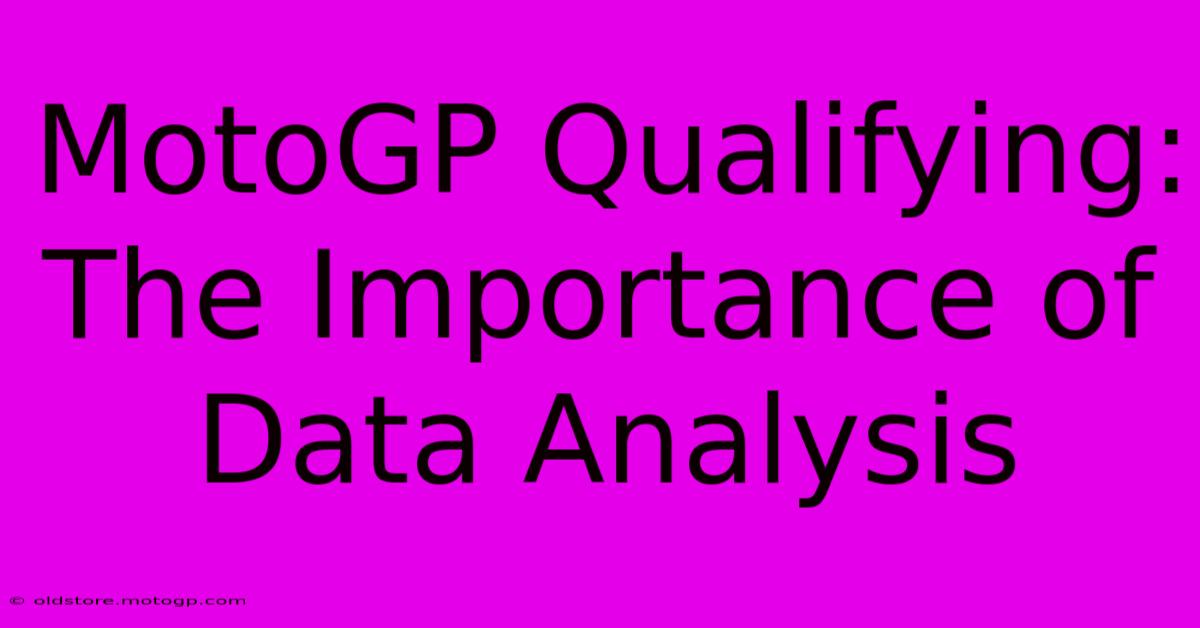MotoGP Qualifying: The Importance Of Data Analysis

Table of Contents
MotoGP Qualifying: The Importance of Data Analysis
MotoGP qualifying is a brutal, high-stakes battle for pole position. It's not just about raw speed; it's about strategy, precision, and leveraging every ounce of data available. In today's technologically advanced world of motorcycle racing, data analysis plays a pivotal role in determining success or failure on Saturday afternoon. This article will delve into the critical importance of data analysis in MotoGP qualifying and how teams utilize it to gain that crucial edge.
Understanding the Data Landscape
Before we examine how data is used, let's understand the sheer volume of information gathered during a MotoGP weekend. Teams collect data from a multitude of sources, including:
- Telemetry from the motorcycle: This includes speed, acceleration, braking, lean angle, engine revs, gear selection, suspension performance, tire temperatures, and much more. This is the most crucial data set.
- Rider feedback: Subjective input from the rider, vital for understanding the bike's handling characteristics and areas for improvement.
- Track conditions: Weather data, temperature, humidity, and even the amount of rubber laid down on the track significantly impacts performance.
- Competitor data: Analyzing the performance and strategies of rival teams offers invaluable insights.
The Role of Sensors and Technology
Modern MotoGP bikes are essentially rolling data centers. A vast network of sensors constantly monitors every aspect of the motorcycle's performance, transmitting this information wirelessly to the team's pit box in real-time. This data is then analyzed using sophisticated software and algorithms.
How Data Analysis Improves Qualifying Performance
The analysis of this data helps teams in several crucial ways:
- Optimal Setup: By analyzing telemetry data from practice sessions, engineers can fine-tune the motorcycle's setup, including suspension settings, aerodynamic configurations, and engine mapping. This ensures the bike is perfectly optimized for the specific characteristics of the track.
- Tire Management: Understanding tire wear and degradation is paramount. Data analysis allows teams to predict tire performance over a qualifying lap, enabling them to strategize tire choices and manage pressures for optimal grip.
- Race Simulation: Simulating race conditions during practice sessions allows teams to test different strategies and predict their performance in the actual race. This provides valuable insights for qualifying strategy, including whether to push for a fast lap early or later in the session.
- Identifying Bottlenecks: Data analysis can pinpoint specific areas of the track where the rider loses time, whether it's through braking, cornering, or acceleration. This allows for targeted improvements and refinements to rider technique.
- Predicting the Weather: Weather patterns can dramatically affect track conditions and qualifying times. Analyzing weather forecasts and their historical impact on lap times aids in strategizing qualifying runs.
The Human Element: Riders and Engineers
While data analysis is incredibly powerful, it's not a magic bullet. The interpretation and application of that data require skilled engineers and riders. The rider's experience and feedback are crucial in refining the analysis and translating data insights into tangible improvements on the track. The collaboration between data analysts, engineers, and riders is what truly drives success.
Conclusion: Data – The Key to Pole Position
In the fiercely competitive world of MotoGP, marginal gains are everything. Data analysis provides the tools and insights necessary to exploit those marginal gains, leading to improved qualifying performance and ultimately, better race results. The sophisticated use of data is no longer a luxury; it's a necessity for success in the pinnacle of motorcycle racing. Teams that effectively utilize data analysis will consistently outperform those that don't. The battle for pole position is increasingly a battle for data supremacy.

Thank you for visiting our website wich cover about MotoGP Qualifying: The Importance Of Data Analysis. We hope the information provided has been useful to you. Feel free to contact us if you have any questions or need further assistance. See you next time and dont miss to bookmark.
Featured Posts
-
Cota Merch Show Your Love For Racing
Feb 25, 2025
-
Moto Gp Arcade Ride To Victory
Feb 25, 2025
-
Free Moto Gp Live Stream Experience The Championship Live
Feb 25, 2025
-
Moto3 Bikes For The Love Of Speed
Feb 25, 2025
-
Moto Gp Tracks Ticket Information And Booking
Feb 25, 2025
